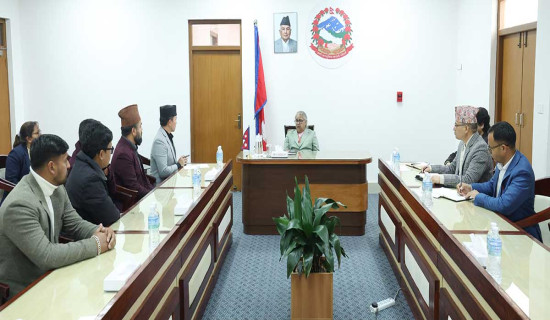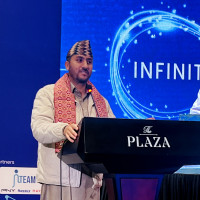- Sunday, 21 December 2025
What can be uploaded in Net and what not?
Kathmandu, July 8: The Cyber Bureau of Nepal Police on Monday arrested a YouTuber on charge of publishing illegal materials in electronic form.
The arrested individual was made public through a press statement by the bureau on Tuesday. According to the statement, 22-year-old Prabesh Lama, a permanent resident of Nuwakot and currently living in Kathmandu, was arrested for uploading a video with obscene title and spreading obscenity in the society.
Lama operates ‘4 Real TV’, a YouTube channel which has 64,000 subscribers. Officials at the bureau informed that Lama was arrested on the basis of the video titled ‘Nepali Girls on Does size matter? (must 100 watch 'till the end!)’, which was uploaded on May 2, 2022.
“A girl seen in the video had requested the YouTuber to not upload her video. However, her request was ignored. She filed a complaint and we arrested Lama,” said Senior Superintendent of Police (SSP) Nabinda Aryal and spokesperson for the Cyber Bureau.
SSP Aryal, who is also the current chief of the bureau, added, "We would have moved forward legally without any complaint if our team had seen the video earlier. It was an obscene content.”
The bureau had earlier arrested several individuals on charges of tampering pictures of high-ranking government officials like the President and Prime Minister without any formal complaints, citing that it was against the law.
Pranksters and singers have also been arrested on different occasions by Nepal Police for publishing illegal materials in electronic form.
Also, the government had recently spoken about the need of prioritising consent of individuals while conducting pranks and before uploading their videos in the internet.
"We don’t need complaints if something wrong has been done. In many cases, the victims don’t want to complain as they fear defamation due to which we conduct preliminary investigation, coordinate with government attorney and move forward legally ourselves," SSP Aryal told The Rising Nepal.
According to the bureau, individuals were mostly arrested under Section 47 of the Electronic Transactions Act, 2008. Section 47 titled ‘Publication of illegal materials in electronic form’ prohibits publishing or displaying of materials which are against the prevailing law or are contrary to the public morality or decency and spreads hate or jealousy.
Anyone found guilty under the offence is liable to the punishment with the fine not exceeding Rs. 100,000 or with the imprisonment not exceeding five years or with both.
“Section 47 is vague because the provision is subjective. It is difficult to identify whether the content was indecent and it caused hate or jealousy against anyone. It needs to be clearer at a time when digital crimes are rampant,” said Prabin Subedi, an advocate working in the sector of cybercrime.
Prankster Alish Rai, who has 649,000 subscribers on YouTube, said that he had been unable to create a new content for his YouTube for around a year now because he was afraid that his contents would lead to his arrest.
“There are many similar contents which are neglected by authorities while they are concerned about a few. It is good to arrest someone for publishing visuals without consent but it is improper to jail someone for their contents,” Rai told The Rising Nepal.
While ‘Nepali Girls on Does size matter? (must 100 watch 'till the end!)’ by Lama had garnered supportive comments on YouTube for trying a new trend in Nepal’s stereotypical community, netizens had applauded his arrest on the Facebook post of Cyber Bureau as well.
“A lack of clear legal provision has created confusions on what contents can be created and uploaded in the electronic form. Digital platforms have a great influence on others and have helped many earn their livelihood. Legal aspects related to digital sector should thus be clear,” said Rai.
Advocate Subedi argues that artistes have recently been arrested for spreading hate or jealousy through their contents which are similar to issues revolving around hate speech.
United Nations states that hate speech is on the rise worldwide with the potential to incite violence, undermine social cohesion and tolerance, and cause psychological, emotional, and physical harm to those affected.
The first International Day for Countering Hate Speech was marked on June 18, 2022, which shows that the global community had started taking the issue seriously.
“An individual has a right to freedom of speech but is not permitted to speak anything hateful. Nepalis have been using hate speech without knowledge as well as intentionally. However, they are unaware of what hate speech includes,” said Santosh Maharjan, President at Yuwalaya, a purely youth led, non-profit, non-government organisation working for and with adolescents of Nepal.
Yuwalaya had recently conducted multiple trainings and awareness programmes on hate speech within and outside the Kathmandu Valley.
“We started intensifying awareness on digital sector and its use as we sighted many misinformation, disinformation and hate speech during the first COVID-19-led lockdown. It showed that Nepalis were turning more active towards digital platforms but were unaware of several aspects. Even the law doesn’t address the digital sector effectively,” said Maharjan.
Cyber Bureau also expressed that there was a need of a detailed law on digital sector.
"Majority of the people use the internet. However, we don’t have a proper law to address the increasing trend of digital crimes. We have also found that people are confused and even unaware about do's and don’ts while using internet. It will be helpful if there was a clear law," said SSP Aryal.
Meanwhile, SSP Aryal said that they would continue their operations under the prevailing laws.
"If something illegal takes places, we will take action. Police cannot arrest anyone. We need warrant, and it is provided by the court," SSP Aryal added.
SSP Aryal suggested that public should know that the freedom of speech doesn’t allow an individual to speak anything s/he wants. "One's comments or contents should not be targeted to a particular individual or group and spread hate or jealousy in society," said SSP Aryal.
















